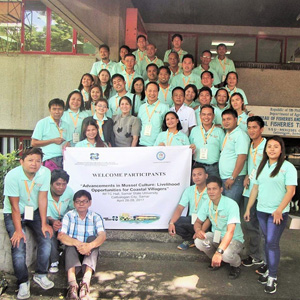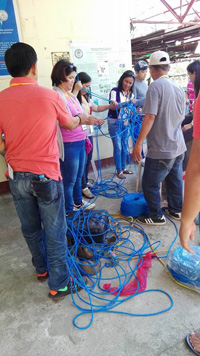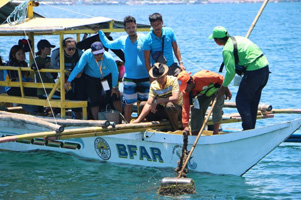 In mussel culture, the use of bamboos as stakes causes siltation, which affects the environment. To replace the use of bamboos in mussel culture, the Philippine Council for Agriculture, Aquatic and Natural Resources Research and Development of the Department of Science and Technology (DOST-PCAARRD), through the Industry Strategic S&T Program (ISP) for Mussels, has been refining raft and longline culture, which promotes increased production, produces better quality mussels, and adopts environment-friendly cultural practices.
In mussel culture, the use of bamboos as stakes causes siltation, which affects the environment. To replace the use of bamboos in mussel culture, the Philippine Council for Agriculture, Aquatic and Natural Resources Research and Development of the Department of Science and Technology (DOST-PCAARRD), through the Industry Strategic S&T Program (ISP) for Mussels, has been refining raft and longline culture, which promotes increased production, produces better quality mussels, and adopts environment-friendly cultural practices.
Despite the effort, this information is not widely known especially in the countryside. To promote these technologies, PCAARRD held a training titled, “A Training on Advancements in Mussel Culture: Livelihood Opportunities for Coastal Villagers” on April 26-28, 2017 at the Samar State University (SSU) Mercedes Campus.
The training aimed to increase awareness of mussel researchers on the advancements or alternative methods of mussel culture, conduct hands-on training on the construction and deployment of alternative mussel culture technology, and solicit suggestions on the formulation of the Pinoy longline Training Manual.
 During the opening ceremony, Dr. Marilyn D. Cardoso, SSU President, said that the S&T intervention in the production of mussels will surely lead Samar’s mussels to be competitive in the market.
During the opening ceremony, Dr. Marilyn D. Cardoso, SSU President, said that the S&T intervention in the production of mussels will surely lead Samar’s mussels to be competitive in the market.
Lectures focused on the ISP for Inland Aquatic Resources and Developed Technologies by Dr. Dalisay DG. Fernandez, Director of the Inland Aquatic Resources Research Division (IARRD) of PCAARRD; Lessons Learned on Mussel Transplantation, Advances in Mussel Farming, and Raft and Longline Culture Technologies: Their Advantages and Economic Benefits by Dr. Carlos C. Baylon, Mussel R&D Program Leader from the University of the Philippines Visayas, Miagao, Iloilo; and Spat Collection Methods by Prof. Renato C. Diocton, Mussel Project Leader at Samar State University.
Longline design and construction was also highlighted in a lecture by Prof. Diocton. A hands-on training on the spat collectors and longline construction was also conducted, wherein the participants were divided into four groups. Each group was tasked to come up with its own setup of longline and spat collectors. Spat collectors were then deployed in Silanga Bay while the longline at Lutao Reef, both in Catbalogan, Samar.
The participants thanked DOST-PCAARRD for the knowledge they gained on advanced mussel culture and for having experienced actual deployment of longline and spat collectors. According to them, they are more equipped now and are willing to share the knowledge to fisherfolk in their area.
Dr. Fernandez concluded the training by challenging the trainee-participants to apply the technology and to provide feedback to DOST-PCAARRD on how the technology had helped in combating poverty in the countryside.

